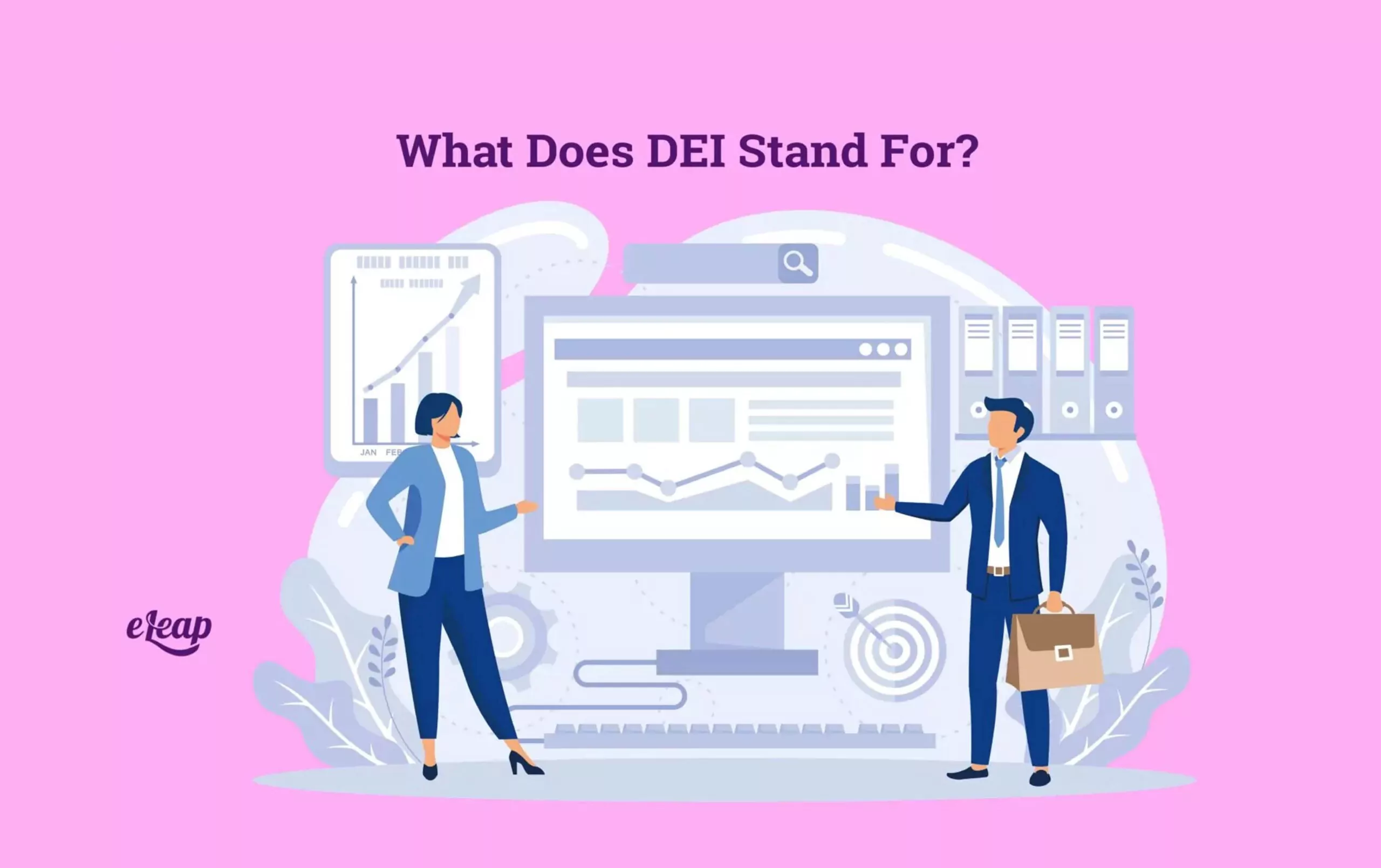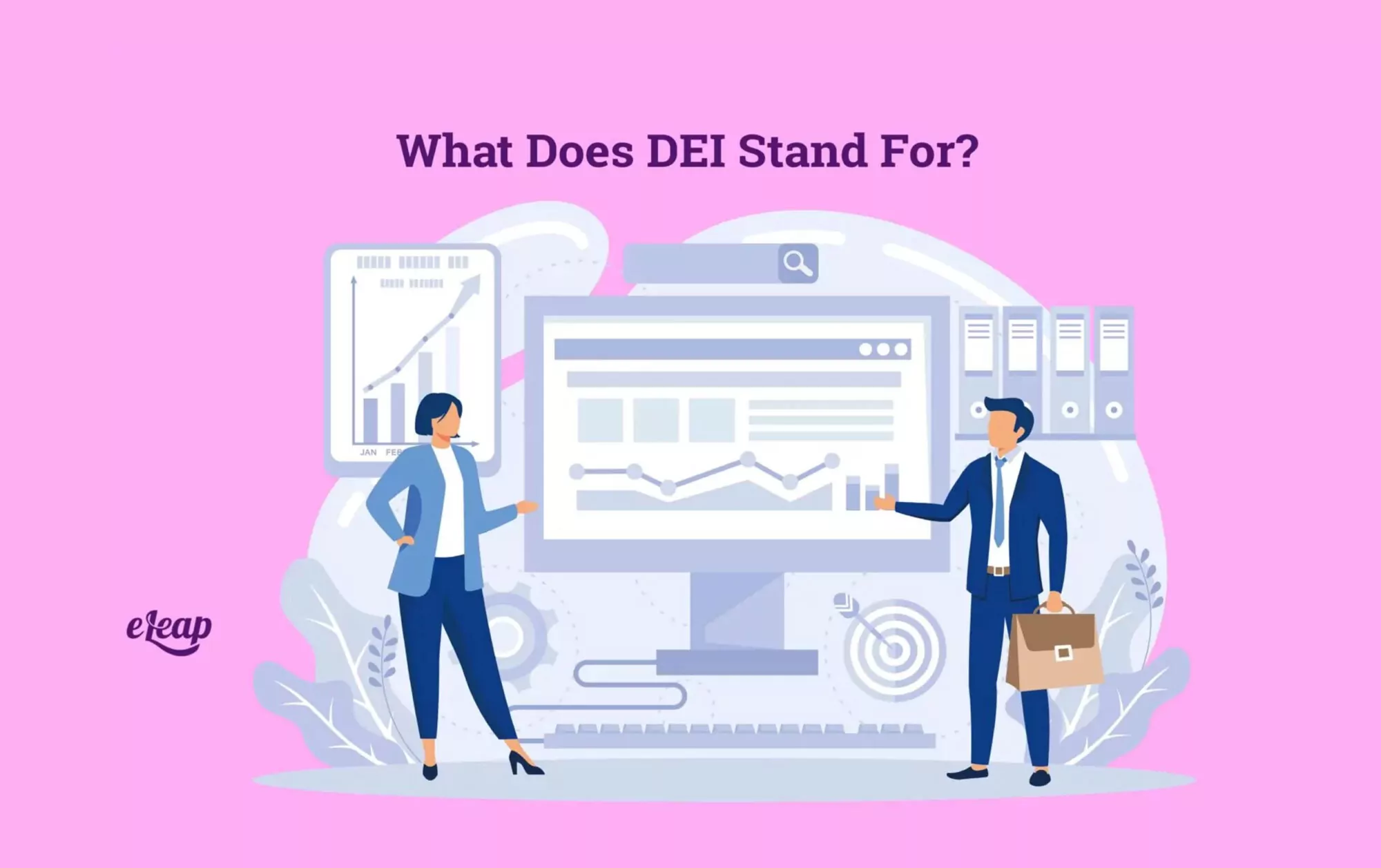What Does DEI Stand For?

There are many buzzwords and phrases in the workplace today, and you may find yourself wondering, “what does DEI stand for?” If so, this article should help clear it up for you. When DEI is a priority in your workplace, it helps every area of your company.
DEI isn’t one size fits all, but there are some guidelines you can follow to make sure you’re implementing it into your company in the right way.
So, What Does DEI Stand For?
DEI stands for diversity, equity, and inclusion. Let’s break down what those three things mean.
Diversity
Diversity is having a group of people whom all have high levels of differences in an area. When it comes to workplaces, this usually entails physical, social, and mental differences. If you have a diverse group, you’ll have different genders, sexual orientations, religions, races, and other diverse groups.
Equity
Equity refers to making sure everyone in your workplace has access to the same opportunities, developments, treatment, and promotion opportunities. The goal of equity is to get rid of any roadblocks in the workplace that would prevent someone from having equal treatment.
These roadblocks can come in a variety of types. Some can be as basic as having a female name versus a male name. Others are on a worker’s physical appearance or educational background. Whatever the barriers are, it’s crucial to get rid of them in the name of equity in the workplace.

Inclusion
Inclusion looks at how people with different backgrounds feel in the company as a whole. While you may have a diverse staff, this won’t automatically mean you have an inclusive staff. Inclusion allows all employees to feel like a valuable part of the team, regardless of their differences.
Why DEI Is Important in Workplaces
If your company isn’t prioritizing DEI and all it stands for, then your employees will likely miss out on reaching their fullest potential. When you have diverse, inclusive teams, you’ll find that your team’s decisions are more thought out because they have many viewpoints giving opinions.
Research also shows that having diverse workplaces contributes to companies performing better than their competition. When your workplace has both gender and racial diversity, you’re more likely to see better profits and more customers.
Overall, successfully implementing DEI in your workplace comes with these benefits:
- Better financial performance
- Becoming the employer of choice for diverse groups
- Having more innovation and growth throughout the company
- Higher employee engagement
- Better decision making
How DEI Affects Each Level of Team Member
Now that you’ve answered the question, “what does DEI stand for?” it’s time to dive into how DEI affects every person in your company. DEI will boost morale, job satisfaction, trust levels, and engagement in the workplace. However, it’s shown benefits in certain job positions as well.
Employees
Your team is 158% more likely to understand a diverse customer if they have at least one member of their team who is part of that diverse group. This relates to gender, age, sexual orientation, race, religion, and culture.
Management
When your company has higher diversity, you’re likely to see as much as 38% more revenue than your competition with less diversity. Having team members from different educational backgrounds, countries, or career backgrounds can all play a part in innovation which helps boost your revenue.
Leaders
The top organizations in the country for gender diversity are more likely to be both profitable and better at creating value with customers. These factors help provide the type of long-term success your company wants.
Steps to Take to Improve Your Company’s DEI
We’ve looked at what DEI stands for and why it’s important. Now, it’s time to look at how you can dissect your current diversity, equity, and inclusion and improve it in the areas it needs. It’s important to remember that DEI should become part of your company’s culture to have a true impact on your employees.
Educate Yourself
The first step to understanding DEI’s importance in the workplace is educating yourself on diverse groups of people. With the push for better inclusion in work and all other areas, there are plenty of resources available for you to study.
This is the best way to make sure you have some background information on groups different than you so you can have a well-rounded idea of how to approach your company’s DEI.
Look at Your Company’s Data
Your next step should be analyzing the data of your team. Take the information you have on each employee and look at the demographics represented. It’s a good idea to separate your leadership and look at the demographics in that area on its own.
When you’ve collected this information, analyze it. From there, you can come up with your DEI goals of where you want to improve on your diversity, equity, and inclusion.
Set Goals and Keep at Them
No matter what your goals look like, it’s important that you make them attainable and then hold yourself accountable for working toward them. When you set goals that you can measure, you’re more likely to follow through with them so keep that in mind.
Consider How You Hire
Look at the resources you use to find your new talent and attract potential employees. Take a strategic approach to where you advertise your open positions. Instead of using your mainstream job posting sites, look for more diverse ones you haven’t used before.
Be Open About Wages
The more secret a company is about wages, the more likely it is that they’re not paying equally. If you want to promote true equity in the workplace, have a transparent approach to wages. You should base all employees’ salaries only on their position and job performance and not on any aspect of diversity.
It can also help to post wage ranges on job postings. This will allow potential hires to know upfront what to expect and will keep the hiring staff open and honest throughout the interview process.
Implement DEI Training for All
As much as your research helps understand what DEI stands for, you need to spread that information to your employees as well. Implement options like diversity training and inclusion events to help promote the DEI way of life in your workplace. This can help employees grow as individuals and can help build the overall teamwork in your company.
Recognize All Holidays
Many companies focus on only the main American holidays. However, part of true inclusion is recognizing and respecting any holidays from other cultures represented in your workplace. Incorporate flexible time off for holidays and customs that are important to individual employees and their culture. This will allow your diverse workforce to feel more welcome in your company.
Be Pronoun-friendly
If you want to promote inclusion and equity, a major step is respecting all identities of your employees. Consider promoting putting pronouns in areas such as e-mail signatures to make them commonplace. This is a much better approach than singling out your employees who may be trans or non-binary, which would lead to the opposite of inclusion.
If you aren’t sure about a person’s pronouns, you may respectfully ask them or choose to use non-binary language until you find out organically.
Don’t Forget Your Remote Employees
In today’s work field, many employees are working remotely, either part or full-time. It can be easy to forget to include them in what’s happening in the office. However, forgetting them leads to lower inclusion levels. Take time to get to know your virtual employees and engage them in events whenever you can.
Focus on Onboarding
Your onboarding process should be extensive and thorough. By the time your new employees hit the floor, you want them already feeling included in the team. A great way to do this is to provide them with a tenured coach or mentor for their first few months so they can have a confidant when they have areas they’re struggling with.
Giving new employees someone to help them feel included is a great start but don’t forget to check in on them regularly as well. For one, you must make sure the mentor-mentee relationship is working. But you can also take the opportunity and develop a relationship with your new employees from the get-go.
Allow Open Communication
One of the biggest ways to promote all DEI stand for is to allow for an open line of communication at all levels of employees. Employees want to feel heard because that allows them to feel truly included in the workplace.
Make feedback a normal part of your workplace and one-on-one meetings part of the norm. As you have these meetings regularly, you’ll build trusting relationships with each of your employees. This approach will allow them to feel valued and included as part of the team.
The Takeaway
You started this article by asking, “what does DEI stand for?” Now, you know that DEI means diversity, equity, and inclusion. Plus, you have an understanding of why DEI is so important in the workplace and how to begin improving them in your company. With the tools you’ve received, you’re ready to make your workplace open and accepting to all.